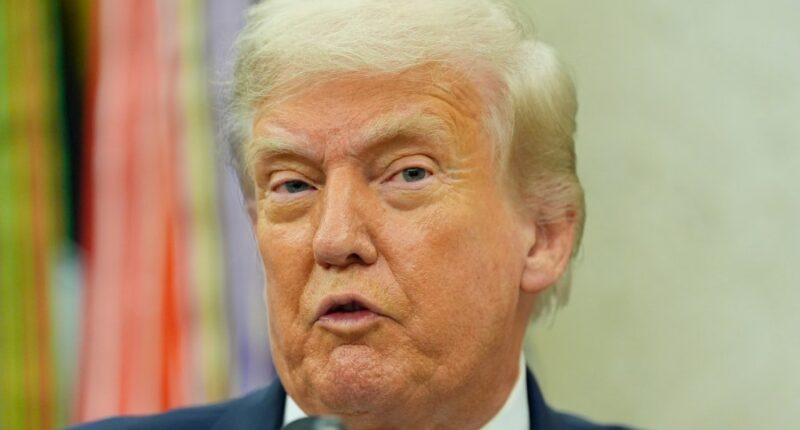Share this @internewscast.com

WASHINGTON (AP) — President Donald Trump announced on Wednesday plans to introduce a 100% tariff on computer chips, potentially leading to increased costs for electronics, cars, household appliances, and other vital products reliant on these processors critical in today’s digital era.
“We will be implementing a roughly 100% tariff on chips and semiconductors,” Trump declared while conversing with Apple CEO Tim Cook in the Oval Office. “However, companies that manufacture in the United States will not face this charge.”
The announcement came more than three months after Trump temporarily exempted most electronics from his administration’s most onerous tariffs.
The President clarified that firms producing computer chips within the U.S. would be exempt from this import tariff. During the COVID-19 pandemic, the scarcity of computer chips led to an increase in car prices and was a contributing factor to rising inflation.
Investors appeared to view the possible tariff exemptions positively for Apple and other prominent technology firms that have pledged substantial financial resources to enhance chip and component manufacturing in the U.S.
Major tech enterprises have collectively vowed to invest approximately $1.5 trillion in the U.S. since Trump’s return to the White House in January. This investment includes Apple’s pledge of $600 billion, which reflects a $100 billion increase since its earlier promise in February.
The key question remains whether the agreement between Cook and Trump will adequately shield the millions of iPhones produced in China and India from tariffs already imposed by the administration, and reduce the need for the company to hike the prices of upcoming models set to be revealed next month.
Wall Street certainly seems to think so. After Apple’s stock price gained 5% in Wednesday regular trading sessions, the shares rose by another 3% in extended trading after Trump announced some tech companies won’t be hit with the latest tariffs while Cook stood alongside him.
The shares of AI chipmaker Nvidia, which also has recently made big commitments to the U.S., rose slightly in extended trading to add to the $1 trillion gain in market value the Silicon Valley company has made since the start of Trump’s second administration.
The stock price of computer chip pioneer Intel, which has fallen on hard times, also climbed in extended trading.
Inquiries sent to chip makers Nvidia and Intel were not immediately answered. The chip industry’s main trade group, the Semiconductor Industry Association, declined to comment on Trump’s latest tariffs.
Demand for computer chips has been climbing worldwide, with sales increasing 19.6% in the year-ended in June, according to the World Semiconductor Trade Statistics organization.
Trump’s tariff threats mark a significant break from existing plans to revive computer chip production in the U.S. that were drawn up during the administration of President Joe Biden.
Since taking over from Biden, Trump has been deploying tariffs to incentivize more domestic production. Essentially, the president is betting that the threat of dramatically higher chip costs would force most companies to open factories domestically, despite the risk that tariffs could squeeze corporate profits and push up prices for mobile phones, TVs and refrigerators.
By contrast, the bipartisan CHIPS and Science Act that Biden signed into law in 2022 provided more than $50 billion to support new computer chip plants, fund research and train workers for the industry. The mix of funding support, tax credits and other financial incentives were meant to draw in private investment, a strategy that Trump has vocally opposed.
—
Liedtke reported from San Ramon, California.
















